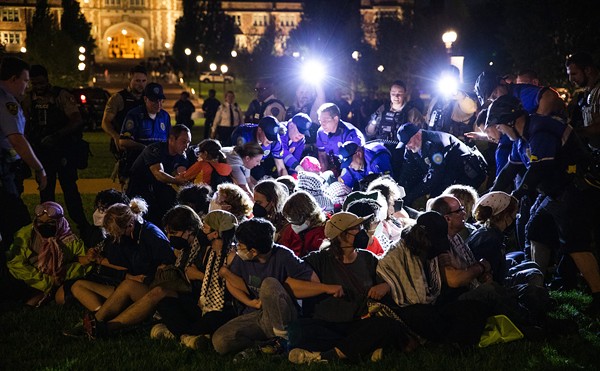Can a cop truly determine whether a man on a sidewalk is packing heat based on the way he adjusts his pants?
No, according to the Eastern District of the Missouri Court of Appeals in an opinion written this week.
Will that ruling benefit Elton Norfolk, who was unlawfully stopped and frisked back in 2009, prompting him to appeal his conviction for unlawful use of a weapon?
No, ruled the appellate judges, because "not all constitutional errors require reversal of convictions."
On August 19, 2009, Officer Julie Reynolds was on a routine patrol near the corner of Lexington and Vandeventer, in a neighborhood that had been the site of recent robberies. She noticed Norfolk standing on the corner, apparently adjusting his pants from the back. That's when Reynolds made the determination that Norfolk was concealing a gun, even though she didn't observe a visible bulge.
Reynolds would later testify: "When they adjust their pants, they adjust in the front. They don't adjust in the back. That's what I commonly see."
After Reynolds observed Norfolk fiddling with his pants, she made a u-turn, parked her car and followed Norfolk into a convenience store. Then she asked him to step outside and put his hands against a wall. Reynolds then lifted Nofolk's shirt, which revealed the butt of a gun sticking out from his waistband. Norfolk was also carrying a magazine, live cartridges and pot.
During the ensuing litigation, Norfolk admitted he was carrying a gun, but filed a motion to suppress it as evidence, based on his belief that he was unjustly stopped and searched.
The trial judge ruled that the search was legit and sentenced Norfolk for three years in prison. Norfolk appealed.
The court of appeals sympathized with Norfolk, opining that Reynolds, a patrol officer with two years experience, did not have reasonable cause to search Norfolk based on the way he adjusted his pants. Such a search violated Norfolk's Fourth Amendment liberties, which preserves the right of citizens to be free from unreasonable searches and seizures, wrote the judges.
"The State failed to flesh out how many previous weapons arrests Officer Reynolds had engaged in and whether the individuals stopped only pulled up their pants in a way to suggest concealing a weapon with nothing more," Judge George Draper III wrote in the unanimous opinion. "Moreover ... [Reynolds] conceded Norfolk could have been merely pulling up his pants at the time she observed him."
But even though, as a general rule, all evidence obtained by illegal searches and seizures is inadmissible in court, the appellate judges ruled that the violation of Norfolk's civil rights was harmless beyond a reasonable doubt.
"Norfolk voluntarily stated under oath at trial that he possessed the gun and the drugs found after the search," wrote Judge Draper. "This confession prevents us from providing Norfolk any claim of relief on his point of error." Draper cited precedent from 1900 and suggested it might be time for the Missouri Supreme Court to weigh in on the issue.
Nick Zotos, an attorney who represented Norfolk during a probation revocation hearing following his trial, was not amused by the ruling.
"It's stop whomever you please and justify it afterwards," says Zotos, summing up his perception of law enforcement strategies in poor neighborhoods. "In north St. Louis the city police are like an occupying army. They treat it like Baghdad."






